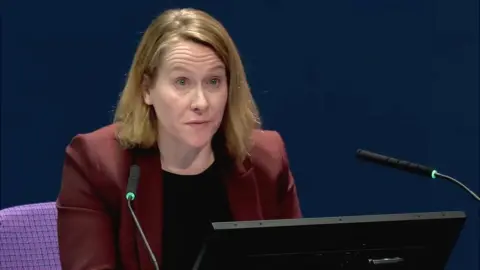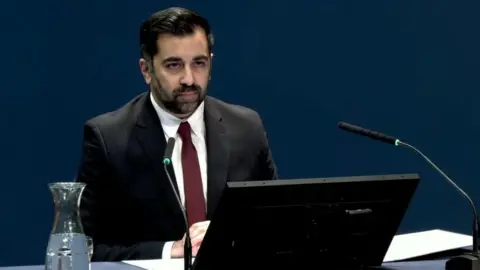UK Covid inquiry in Scotland: Five things we learned in week two
 PA Media
PA MediaThe UK Covid inquiry has heard a second week of evidence in Scotland as it attempts to understand the process by which decisions during the pandemic were reached. Here are five things we learned.
1. Deleting WhatsApp messages
The inquiry has been looking at the informal communications between Scottish government advisors and ministers.
Liz Lloyd, who served as chief of staff and a strategic adviser to Nicola Sturgeon while she was first minister, gave evidence on Thursday.
In one text conversation with Ms Lloyd in October 2020, the first minister called Boris Johnson a "clown", using an expletive.
Ms Lloyd, who described herself as Ms Sturgeon's "thought-partner", said this was an expression of frustration because the Prime Minister had not made it clear that his announcement of a second lockdown did not apply to Scotland, and she felt this risked confusing the Scottish public.
She also told the inquiry that she had lost her messages prior to September 2020, which meant she had none covering the initial stages of the pandemic.
Chief Medical Officer Professor Sir Gregor Smith and National Clinical Director Professor Jason Leitch both said they regularly deleted their WhatsApp messages - and both said this was in line with Scottish government guidelines.
The inquiry saw one message where Prof Leitch described this as a "pre-bed ritual", although he himself described this as "slightly flippant and an exaggeration".
Ms Sturgeon, who will give evidence next week, says the inquiry does have messages from her - although she had not retained them on her own device.
2. Creating a 'rammy'
Liz Lloyd told the inquiry that one of the first things the Scottish government did when the pandemic started was to suspend work on independence and a second referendum.
She was asked about Scottish government cabinet minutes from June 2020 which stated that consideration should be given to "restarting work".
In evidence, Nicola Sturgeon's former chief of staff said it was not decided to do anything other than "think", and added: "There is nothing that I am aware of that the government proactively did."
Ms Lloyd denied that was politicising the pandemic to advance the cause of independence, saying it was about wanting to provoke action by Westminster on policy.
The inquiry was shown a WhatsApp message where Ms Lloyd told Ms Sturgeon that she wanted a "good old-fashioned rammy", or public spat, with the UK government about furlough ending when the Scottish government wanted to apply restrictions.
Questioned by the Chair, Baroness Hallett, Ms Lloyd said it would have been "a public spat for a purpose. A public spat could often deliver results".
3. First Minister's apology
 PA Media
PA MediaFirst Minister Humza Yousaf apologised unreservedly to both the inquiry and to those who lost loved ones for the Scottish government's failure to hand over WhatsApp messages related to its handling of the pandemic.
"There is no excuse for it. We should have done better," he said.
Shortly before giving evidence to the inquiry, he told the Scottish Parliament there would be an externally-led review of the use of informal messages in making government decisions.
4. Nicola Sturgeon's 'tighter cast list'
Humza Yousaf told the inquiry that during the pandemic he had sometimes attended what became known colloquially as gold command meetings involving Nicola Sturgeon and a small group of advisers and a revolving group of ministers.
"There were times when the former first minister needed a tighter cast list, and wanted to make a decision on a very specific issue," he said.
Mr Yousaf served as justice secretary at the start of the pandemic, then became health secretary in May 2021.
He said decisions were taken at the gold command meetings, which unlike cabinet meetings were not minuted, but said that this was a rare occurrence.
The inquiry was then shown an exchange with the national clinical director on the day Mr Yousaf took over as health secretary.
In it, Professor Jason Leitch said: "There was some first minister 'keep it small shenanigans' as always. She actually wants none of us."
Mr Yousaf, asked if this was an indication that the former first minister preferred to take decisions on how to deal with the pandemic herself, said this was instead "a classic example of Jason perhaps over-speaking".
5. Advice on lockdown rules
The inquiry also saw an exchange of messages from November 2021, where Prof Leitch advised Mr Yousaf to "have a drink in your hands at all times" in order to get around restrictions on face mask wearing.
The national clinical director told the then health secretary that officially he needed a face mask when standing at a dinner - but added that "literally no-one does".
Prof Leitch acknowledged to the inquiry that "strictly speaking" it was breaking the rules. He said the guidance was nuanced and denied he was offering Mr Yousaf a workaround.
In his evidence, Mr Yousaf said it wasn't unusual for him to "double, triple, quadruple check" his understanding of the particular nuances of any lockdown guidance, adding" "I always wanted to make sure that I was absolutely complying."
He told the lead counsel to the inquiry, Jamie Dawson KC, that there were times when the rules were complex, and recalled a point in the pandemic when the government was talking about things like "vertical drinking".
Mr Yousaf said: "These were phrases that we hadn't used before, didn't mean much to folk, and we were responding in real time to events."
